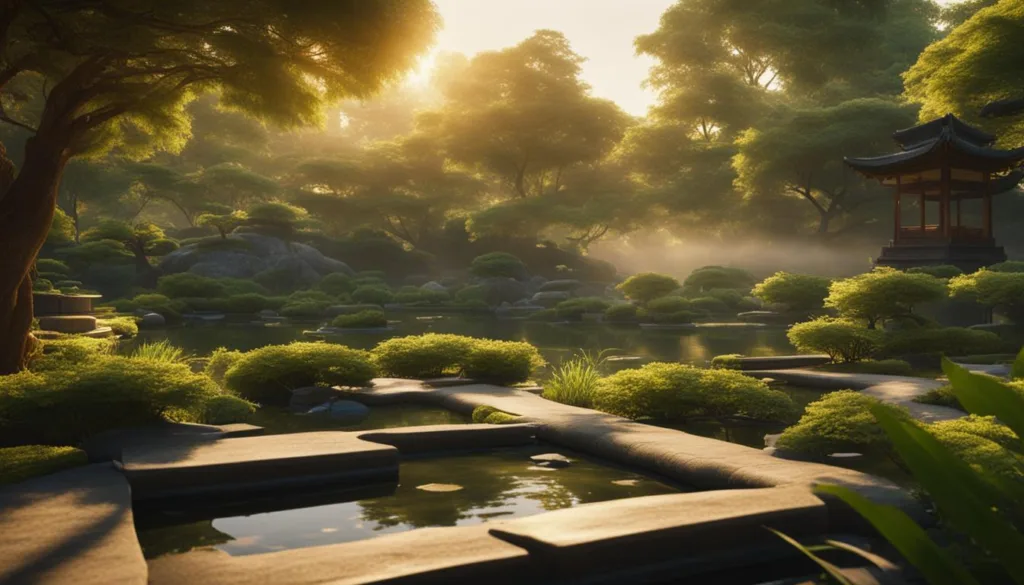Zen Gardening Essentials for Serene Outdoor Spaces
Welcome to our guide on Zen gardening, where we explore the art of creating peaceful outdoor spaces inspired by Japanese garden design. In today’s fast-paced world, finding moments of calm and mindfulness is essential for our well-being. That’s why we’re here to show you how cultivating a Zen garden can provide a sanctuary of tranquility in your own backyard.
A Zen garden, also known as a Japanese rock garden, is a minimalist-style garden that combines rocks, gravel or sand, and carefully selected plants. These gardens originated in the sixth century as meditation aids for Zen Buddhist monks. Today, they continue to bring a sense of peace, serenity, and mindfulness into our lives.
Key Takeaways:
- Create a serene outdoor space with Zen gardening
- Find inspiration in Japanese garden design
- Cultivate mindfulness through gardening
- Experience the tranquility of a peaceful garden
Designing Your Zen Garden
When it comes to creating your Zen garden, careful planning and consideration of design principles are essential. To get started, it’s important to plan and create a small Japanese garden concept in your home before implementation. This allows you to visualize the layout and ensure it complements your existing space.
First, choose an area that is easily visible from inside your home. This way, you can enjoy the tranquility of the Zen garden from various vantage points. Consider the shape and layout of the garden, keeping in mind the principles of simplicity and naturalness.
In terms of plant selection, Zen gardens typically feature minimal vegetation. However, choosing plants with contrasting textures and colors can enhance the overall aesthetic. Opt for low-maintenance plants that blend harmoniously with the surrounding rocks and gravel. This will create a visually pleasing and serene environment.
To add an extra touch of serenity, consider incorporating water features into your Zen garden. A bamboo-made water feature or a small pond can create a calming soundscape and further enhance the peaceful ambiance.
In addition to plants and water features, rocks and moss play crucial roles in Zen garden aesthetics. They symbolize real-world elements such as islands, mountains, and forests. Carefully positioning rocks and cultivating moss in the desired areas adds depth and visual interest to your Zen garden.
Remember:
- Plan and create a small Japanese garden concept in your home before implementing it
- Select an area that is easily visible from inside your home
- Consider the shape and layout of the garden
- Choose plants with contrasting textures and colors
- Incorporate water features for added tranquility
- Add rocks and moss to symbolize natural elements
By following these Zen garden ideas and principles, you can create a harmonious and serene outdoor space that promotes relaxation and mindfulness.
Incorporating Essential Elements
Creating a Zen garden involves incorporating essential elements that promote tranquility in gardening and capture the aesthetic principles of Zen garden design. These elements include rocks, gravel or sand, plants, stone paths, bridges, lanterns, and water features.
Rocks as Focal Points
In Zen gardens, rocks are carefully positioned as focal points, representing naturalistic sculptural elements. They symbolize mountains, islands, or other landscape features. The choice of rocks should be based on their shape, size, and texture, evoking a sense of harmony with nature.
Gravel or Sand for Symbolic Water
Gravel or sand is an essential element in Zen gardens, representing water. It is often raked into patterns to mimic the gentle ripples of water. The act of raking the gravel or sand can be a meditative practice that brings a sense of calmness and serenity to the garden.
Low-Maintenance Plants
The choice of plants in a Zen garden should align with the principles of simplicity and naturalness. Select low-maintenance plants that complement the overall design and create a harmonious balance. Plants with interesting foliage or delicate flowers can add visual interest to the garden without overwhelming the minimalist aesthetics.
Stone Paths, Bridges, Lanterns, and Water Features
Stone paths provide a peaceful and contemplative journey through the garden, inviting reflection and mindfulness. Bridges can symbolize a transition from one state of mind or area to another. Lanterns add a touch of elegance and serenity, while water features such as bamboo-made water features or small ponds introduce a soothing element of sound and movement.
It is important to ensure that these additional elements are thoughtfully incorporated into the overall design, promoting a sense of tranquility and mindfulness in the garden.

| Element | Description |
|---|---|
| Rocks | Carefully positioned as focal points, representing naturalistic sculptural elements |
| Gravel or Sand | Symbolic of water and often raked into patterns for a soothing effect |
| Low-Maintenance Plants | Complement the overall design and require minimal upkeep |
| Stone Paths | Provide a peaceful and contemplative journey through the garden |
| Bridges | Symbolize transitions and create a sense of connectivity |
| Lanterns | Add elegance and serenity to the garden |
| Water Features | Introduce soothing sounds and movement |
Conclusion
Zen gardening offers a gateway to Japanese culture, inviting us to embrace the tranquility of nature and embark on a journey of self-reflection and transformation. By creating a Zen garden, we can escape the chaos of everyday life and find solace in the serene and peaceful outdoor space we cultivate.
Through the art of Zen gardening, we can alleviate stress, improve focus, and cultivate a profound sense of well-being. The careful planning and adherence to design principles allow us to create a harmonious environment that brings balance and harmony to our lives.
Once our Zen garden is complete, we have the privilege of enjoying a sanctuary that can be used for meditation, contemplation, or simply to find a moment of tranquility amidst the beauty of nature. Whether we choose to sit in quiet reflection or engage in mindfulness activities, our Zen garden always offers a serene respite.
For those seeking professional guidance in creating a customized Zen garden, consider reaching out to Landtech Scenery Inc. Their expertise can help you transform your outdoor space into a haven of peace and tranquility, where the principles of Zen gardening come to life.
FAQ
What is a Zen garden?
A Zen garden, also known as a Japanese rock garden, is a minimalist-style garden that uses rocks and a few types of plants. It follows principles of naturalness, simplicity, and austerity to create a peaceful and serene outdoor space.
How do you design a Zen garden?
To design a Zen garden, carefully plan and create a small Japanese garden in your home. Consider the shape and layout of the garden, select low-maintenance plants for their texture and color, and incorporate elements like rocks, gravel or sand, and water features.
What are the essential elements of a Zen garden?
Essential elements in a Zen garden are rocks, gravel or sand, and plants. Rocks are positioned as focal points, gravel or sand represents water and is often raked into patterns, and carefully selected plants complement the overall design. Other elements like stone paths, bridges, lanterns, and water features can also be included.
How do you maintain a Zen garden?
Maintenance of a Zen garden involves picking up debris, recreating ripples in the gravel or sand, and tending to plants if included. Regular care and upkeep will ensure the garden remains serene and tranquil.
What benefits does a Zen garden offer?
Zen gardens bring Japanese culture closer and offer a space for self-reflection and transformation. They can help alleviate stress, improve focus, and cultivate a sense of well-being. Creating and maintaining a Zen garden provides a soothing and peaceful environment.






